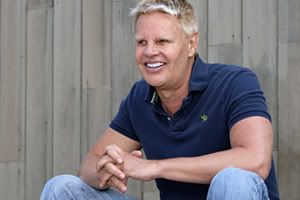
But no—it was no accident. He destroyed his own face with vanity.
He wants desperately to look like his target customer (the casually flawless college kid), and in that pursuit he has aggressively transformed himself from a classically handsome man into a cartoonish physical specimen: dyed hair, perfectly white teeth, golden tan, bulging biceps, wrinkle-free face, and big, Angelina Jolie lips. But while he can't turn back the clock, he can -- and has -- done the next best thing, creating a parallel universe of beauty and exclusivity where his attractions and obsessions have made him millions, shaped modern culture's concepts of gender, masculinity and physical beauty, and made over himself and the world in his image, leaving them both just a little more bizarre than he found them.I’m not sure I can even totally explain the odd chain reaction response that went through me. I was sort of shocked, and sort of mad, and, ultimately, sort of sad.
There’s a girl called Amber, who lives quite near me. She was born with severe craniofacial deformities, and has had, in her 25 or so years, about 100 surgeries to try to correct them. I don’t know her, but my sister does. I do, however, remember the first time I saw her. She was maybe 6, and I was maybe 12, and I was at my old elementary school to watch my sister in the talent show. One of the acts was a little girl, dancing with her mom. She looked like no little girl I had ever seen. I remember hearing people gasp, and their gasps made my back go very straight and my eyes narrow. I wanted to tell them to shut up. I wanted to tell them she was the bravest person I’d ever seen. Instead, I crept closer and looked at her. And I remember thinking, in the weird kind of way that shy 12-year-olds who never have their noses out of books do, that she seemed almost magical twirling around and around in circles, and that she looked like a beautiful Picasso.
I have a particular compassion and admiration for people with facial abnormalities. Our faces are so much of who we are—we judge people’s characters by their faces; we look into their eyes and decide whether to trust them. It doesn’t matter whether we love our looks or hate them; our identities our wrapped up in our own faces, and though we may obsess about that strange little bump here or how that bit squinches funny when we smile, most of us will never know what it feels like to have other people react with shock or horror at our faces. Facial disfigurement can completely change a person’s life; I read on Sunday, about an Iraqi veteran whose face was forever changed by an explosion. He hid behind sunglasses and turtlenecks, until, eventually, he got reconstructive surgery that helped a bit—and he resolved to get used to his new face.
So in some strange way, all of this made me angry at Jeffries, irrational though that may be, knowing that he had deliberately abandoned a “normal” face for which others would happily have given anything in exchange, all in the pursuit of beauty. But then I thought about what that meant, to be so fearful and vain, and I felt sorry for him instead.
I saw Amber again many years later, on a talk show, discussing her face and her many surgeries. They showed a clip of her cheerleading at a football game. She seemed to worry about her face a lot less than everyone else did.
"If I had a perfect face, I wouldn't be the person I am today," she says. "Many of my best traits come from experiencing life with this face."Jeffries ought to consider putting that on a t-shirt.
(You can read more about Amber here.)




Shakesville is run as a safe space. First-time commenters: Please read Shakesville's Commenting Policy and Feminism 101 Section before commenting. We also do lots of in-thread moderation, so we ask that everyone read the entirety of any thread before commenting, to ensure compliance with any in-thread moderation. Thank you.
blog comments powered by Disqus